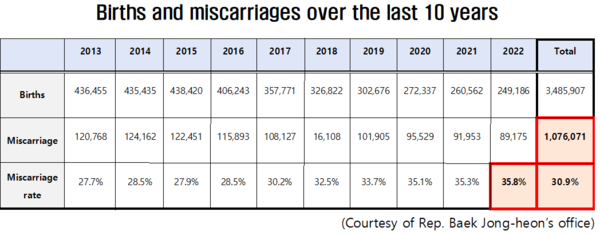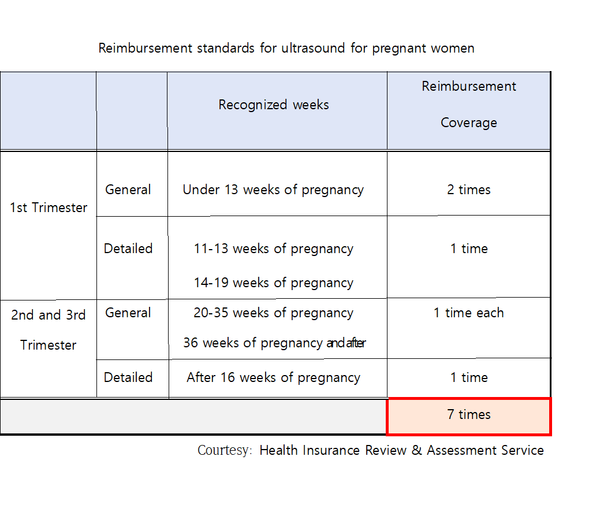Amid the severe problem of declining birth rates threatening national sustainability, it has emerged that over the last 10 years (2013-2022), one in three newborns have been miscarried.

Seoul has shown the most alarming level nationwide, recording a miscarriage rate of 40.74 percent last year.
According to data by the National Health Insurance Service (NHIS) submitted to Rep. Baek Jong-hean of the ruling People Power Party (PPP), a cumulative total of 1,076,071 miscarriages occurred over the past decade.

Upon examining domestic birth and miscarriage data from 2013 to 2022, a total of 3,485,907 newborns were born in the past 10 years. However, of these, 1,076,071 (30.9 percent) ended in miscarriage.
The miscarriage rate, which was 27.7 percent in 2013, continued to increase in all the years except 2014 and hit a record high of 35.8 percent in 2022.
Also, when analyzing the number of births and miscarriages per city/province over the 10 years, all regions demonstrated a rising miscarriage rate, with Seoul (40.74 percent) and South Jeolla Province (40.64 percent) surpassing the 40 percent mark.
In terms of age, miscarriages among expectant mothers in their 30s (30-39 years) accounted for most cases with 664,583 cases (61.76 percent), followed by those in their 20s with 218,915 cases (20.34 percent).
"The fact that more than 880,000 miscarriages among mothers in their 20s and 30s, who are otherwise healthy, are caused by the failure to check the health of the fetus in time," Rep. Baek said. "Periodic ultrasound check-ups for fetal health are essential for expectant mothers who have made a significant decision to have a child in the era of low births."
However, Baek stressed that health insurance provides limited reimbursement for ultrasound scans and exacerbates the financial worries of prospective mothers.

Looking at the Health Insurance Review & Assessment Service's ultrasound reimbursement standards for pregnant women, the government reimburses up to two general ultrasound scans and one detailed ultrasound scan for expectant mothers in the first trimester of up to 13 weeks of pregnancy.
From 14 weeks of pregnancy to the due date in the second and third trimesters, up to three general ultrasound scans and one detailed scan are supported.
"This means that the NHIS only reimburses seven ultrasound tests," Baek said. "Also, if an expectant mother test receives tests outside of the scheduled trimester, they bear all costs even if the total ultrasound examination tallies up to seven."
However, an examination of ultrasound claim data from 280 days before birth to the due date over the last five years revealed that eight out of 10 mothers who received an ultrasound scan last year underwent more than seven scans, he added.
According to Baek, the average number of ultrasounds received by a single expectant mother last year was 10.5.
"It appears that the NHIS's project for supporting prenatal ultrasounds is not providing sufficient help,” the lawmaker said.
"Without active support for pregnancy and childbirth, maintaining the current system will continue to increase the domestic miscarriage rate, and it will be impossible for Korea to escape the lowest total fertility rate in the OECD."

